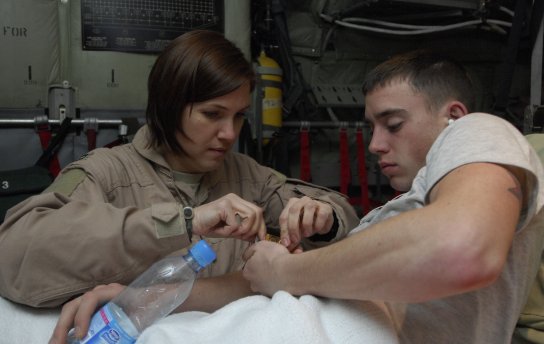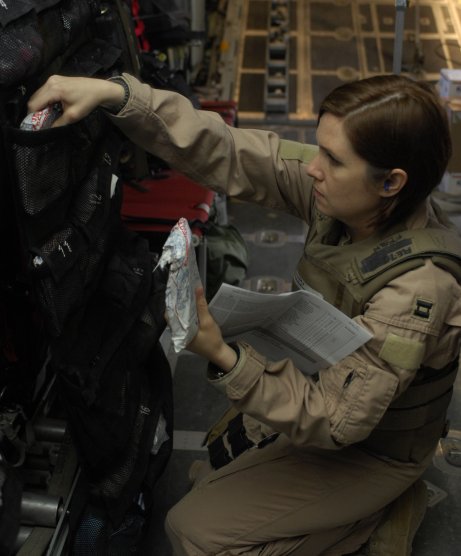
Capt. Susan McCormick, 455th Expeditionary Aeromedical Evacuation Flight, gives medicine to Airman 1st Class Brent Noah, 376th Aircraft Maintenance Squadron in flight to Bagram Air Field, Afghanistan

Capt. Susan McCormick, 455th Expeditionary Aeromedical Evacuation Flight, inventories her equipment in flight to Manas Air Base, Krygyzstan, March 26. Capt. McCormick prepares for each flight depending on the report given to her by the ground medical team. “I try to think about the worst, but really we have no idea what the patient will look like when they arrive,” said Capt. McCormick. She is deployed from Westover Air Reserve Base, Mass.
.
Flight Nurse Provides Care in the Air
by Senior Airman Erik Cardenas
BAGRAM, Afghanistan
While troops on the ground are risking their lives fighting terrorism, Capt. Susan McCormick feels it’s her mission to provide the best emergency care to those troops so they can return to their families back home.
“I couldn’t picture myself doing anything but this, giving someone the chance to survive when they risk their lives everyday for us,” said the captain from the 455th Expeditionary Aeromedical Evacuation Flight.
The 33-year-old captain enlisted as a reserve medical technician in the aeromedical evacuation career field in 1994. As a technical sergeant in 2003, she received her commission to become a licensed flight nurse.
With two deployments under her belt and the third one in Bagram, Afghanistan, her six years as a nurse in the operating and emergency rooms at St. Vincent’s Hospital, Worcester, Mass., are coming full circle.
“Each deployment has helped me better myself and my training,” said Capt. McCormick from the 439th AEF, Westover, Air Reserve Base, Mass. “The skills we use in flight need to be practiced daily. My experience in the OR and ER, has helped me become a better nurse.”
Members of the 455th EAEF are on call 24-hours-per-day, seven-day-per-week, covering Afghanistan and Kyrgyzstan. The unit has three types of missions: an alpha alert with an hour response time for critically injured; bravo alert, with a two hour response time, for patients who do not need immediate evacuation; and a scheduled flight twice a week for patients who need care or treatment that cannot be provided at their deployed location.
Each alert, depending on the situation, requires a different amount of personnel. On an alpha alert there is a three person crew, consisting of one nurse and two medical technicians that allow the team to quickly respond and get airborne. A bravo alert crew has either a three or five person medical crew depending on the number of patients and their acuity. On a scheduled flight, there is a five person crew on board, with two nurses and three medical technicians.
Before each mission, Capt. McCormick has to physically prepare for each flight by arranging equipment and configuring the aircraft for the medical mission, but also mentally prepares by visualizing what the patient’s condition is and how it could progress in-flight. She relies on the report given by the ground medical team at the forward operating bases, and the training she received at flight school regarding the stresses of flight and how it could affect the patient’s condition at altitude.
“I try to think about the worst, but really we have no idea what the patient will look like when they arrive,” said Capt. McCormick. “With all the years I have been doing this, nothing can really prepare you to see a child who has devastating blast injuries.”
In flight, patient conditions are subject to change, the altitude, cabin pressure, and weather are concerns of the crew. The crew’s assessment skills are diminished by the lack of light and a noisy environment.
Sometimes at forward operating bases, the medical staff’s limited access to medical equipment leads to the patient not being diagnosed accurately or completely, she said.
“My crew had one patient who was status post-IED explosion and was stable until they took off,” said Capt. McCormick. “At altitude, the patient’s oxygen level decreased drastically and with the diagnoses given to us by the forward operating base, they didn’t understand what was happening with the patient. They treated the condition and kept the patient stable until he was re-evaluated at Bagram and diagnosed with a hemo-pneumo thorax that wasn’t found at the FOB. “
The captain has treated 40 patients in the three months she has been deployed here. As each day gets warmer, Capt. McCormick expects to treat more patients as insurgent activity traditionally rises during the spring and summer. But the seasoned nurse said she’s more than ready to go when she gets the call.
“I’ll fly anywhere on any plane in order to evacuate our men and women who are sick or injured and make sure they get the care they need,” she said.

Wild Thing’s comment…….
God bless Capt. Susan McCormick!

Thank you Chrissie, Capt. Susan McCormick is one of many angels of mercy who put their life on the line to save others, like 1st Lt. Sharon Ann Lane who passed under my watch. God bless them all.
Jack, thank you so much for the link about Sharon.